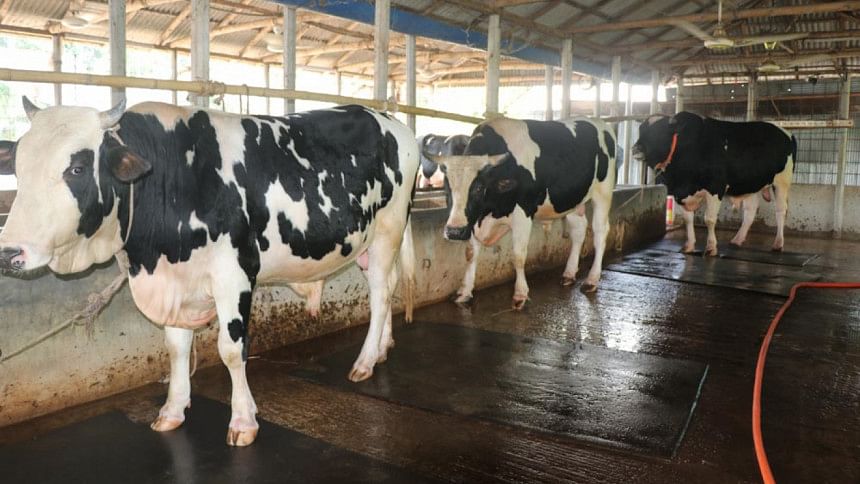Sacrificial animal traders eye big sales ahead of Eid

Livestock traders and farmers in Bangladesh are eyeing big sales of sacrificial animals centring this year's Eid-ul-Azha, but their dreams of hefty profits may be thwarted by ongoing inflationary pressure.
According to officials of the Department of Livestock Services (DLS), the number of sacrificial animals prepared this year exceeds the expected demand.
Around 1.3 crore sacrificial animals have been prepared across the country, with 52 lakh being cows and bulls, 1.6 lakh buffalos, 68.5 lakh goats and 7.67 lakh lambs, said Md Shariful Haque, deputy director of the DLS.
"About 1.25 crore sacrificial animals were prepared for the last Eid-ul-Azha while an additional 4.44 lakh were prepared this year in anticipation of higher sales," he added.
Haque informed that while 1.041 crore animals were sacrificed last year, the DLS expects the demand to be at least 10 percent higher this year.

But although the demand for sacrificial animals has increased, the prevailing inflationary pressure could curtail people's purchasing capacity and thereby reduce profits, said Md Imran Hossain, president of the Dairy Farm Owners Association.
"The sale of sacrificial animals depends on the socioeconomic condition. Many people have lost their purchasing ability due to heightened inflation in recent times, which calls into question their ability to pay the expected prices," he added.
Against this backdrop, Imran urged the government to stop animal imports for the sake of local farmers.
"We have enough sacrificial animals in the country. So, if livestock from India or other neighbouring countries do not come in the Eid market, then local farmers will get the expected prices," Imran said.
And although sales of sacrificial animals have yet to begin at the field level, wholesale traders and big farms are already busy selecting their best livestock for the Eid market.
Still, the delay is significant as it marks a change from the tradition where most sacrificial animals are sold from the field level to wholesalers a month ahead of the major religious festival for Muslims.
"We are yet to see the expected number of customers in the wholesale market," said Saiful Islam, president of the Dairy Farm Owners Association in Pabna.
Saiful had fattened 30 cows and bulls in anticipation of Eid sales but most of the animals had remained unsold as of Sunday as he was not getting the expected prices.
"The production cost per maund [37 kilogrammes] can reach up to Tk 28,000 each month for excessive feed and maintenance costs, but wholesalers are reluctant to pay more," he added.
On the other hand, Raju Ahmed, a livestock trader of Jalalpur village in Pabna, said he fattened 32 cows and bulls and already sold 25 to wholesalers in Dhaka for a handsome price.
"Each animal sold for Tk 8-10 lakh on average while the biggest cow, weighing approximately one tonne, sold for Tk 26 lakh last week," he added while informing that he expects to sell the rest in one week.
This correspondent also found that most traders and farmers are preparing more middle and small size livestock this year considering the current market conditions.
"It cost up to Tk 18,000 each month to fatten livestock this year while it was Tk 16,000 last year. This is because feed prices have soared, with each 50-kilogramme bag now costing a minimum of Tk 200," said Md Raju, a farmer of Ramkharua village in Sirajganj.
Also, higher labour costs, utility bills and other expenditures increased the burden on farmers, he added.
So, considering these excessive costs, livestock weighing more than five maunds will be sold for Tk 28,000 per maund while the price of smaller animals will be Tk 30,000 per maund, said Pabna Dairy Farm Owners Association President Islam.
According to him, Pabna and Sirajganj are the country's biggest hubs for raising and trading sacrificial animals centring Eid-ul-Azha.

 For all latest news, follow The Daily Star's Google News channel.
For all latest news, follow The Daily Star's Google News channel. 








Comments